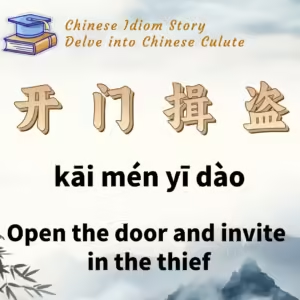
Chinese Idiom: 开门揖盗 (Kai Men Yi Dao)
English Translation: Open the door and invite in the thief
pīn yīn: kāi mén yī dào
Idiom Meaning: Refers to inviting trouble or danger by one’s own actions; metaphorically, it means to bring harm upon oneself by inadvertently welcoming it.
Historical Source: Records of the Three Kingdoms by Chen Shou (《三国志·吴书 ·吴主传》).
Idiom Story
During the late Eastern Han Dynasty, China was in a state of chaos with various warlords vying for power. Sun Jian was a prominent warlord who established control over the Jiangdong region. After his death in 191 AD, his son Sun Ce succeeded him and continued to consolidate power in the region.
In 200 AD, Sun Ce was assassinated during a hunting trip, and his younger brother Sun Quan, along with his chief strategist Zhang Shao, was left to lead. On his deathbed, Sun Ce advised Sun Quan to be vigilant and to effectively manage the Jiangdong territory to ensure its prosperity amidst the turbulent times. Sun Ce acknowledged that while Sun Quan might lack his own military prowess, his ability to appoint capable individuals and manage the region was unparalleled.
Zhang Shao, however, cautioned Sun Quan against excessive mourning and rigid adherence to traditional rituals. He argued that during times of crisis, such as the present, it was crucial to prioritize the nation’s stability over ceremonial proprieties. He likened strict adherence to rituals amidst the chaos to “opening the door and inviting in the thief,” which would only lead to greater trouble and jeopardize their position.
This expression, “开门揖盗,” was thus used to describe the act of inviting or welcoming potential trouble through one’s actions or decisions, highlighting the need for practical judgment over ceremonial formalism during critical times.






